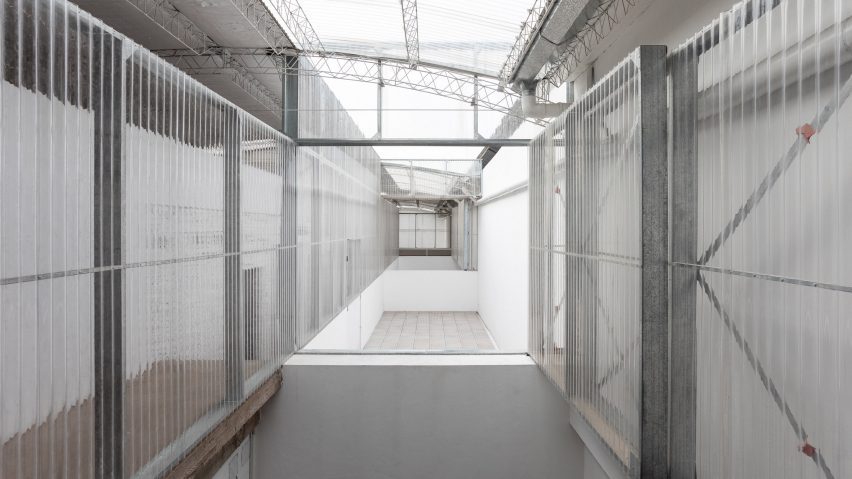Local architect Julio Sanchez Arimayn has converted an industrial warehouse building into creative studios interspersed throughout two stories and punctuated by mezzanines in Buenos Aires.
Called Espinosa Estudios, the 900-square-metre building contains seven studio spaces, cooking areas, a porch, restrooms and a cafe to host creative programming.
"It was a warehouse, with a series of buildings inside," said Arimayn's team. "A house upfront converted into offices, a chorizo house in the centre, a large industrial mezzanine – a concrete structure without much meaning. It was a great sum of moments and patched needs, all under a large tin roof."
On the ground level, Arimayn placed studio spaces of increasing size along one side of the building, creating an internal "street" that runs alongside them.
The building's entrance lies at the beginning of the ground-level hallway, while a cafe was placed directly to its side. Bathrooms and kitchens are located at the centre of both floors and surround a staircase.
"All the workspaces are linked to this street, allowing and encouraging interaction, the possibility of crossover, collaboration," said the team.
This hallway runs the interior length of the building and is semi-covered by second-floor openings, mezzanines and a tile-floor porch located at the centre of the building.
The largest of the ground-level spaces sits at the end of the building and is double-height, exposed to the building's curving roof.
In the same space, a white insertion creates a gallery or stage space, further denoted by curved corners that hit the otherwise concrete floor.
On the first floor, the creative spaces are much larger and connect to the building's open-air porch, or "lung".
"A porch on the first floor generates a common outdoor space and functions as the lung of the project," said the team.
The interior is lined with translucent polycarbonate panels, and has double-height spaces and openings so that it receives natural light from the large, glazed openings in the domed roof.
Some openings and gaps throughout the first floor connect directly to the outdoors.
Arimayn used concrete, galvanized steel and white-washed walls to make up the majority of the interior, while textural details were interspersed throughout.
"[The materials] were selected to create the large surfaces we needed without the need for external suppliers, but rather could be manufactured on-site," said Arimayn. "This is how we were able to lower construction costs considerably."
Other material details include a small wall section covered in fluted concrete, white-washed brick, French doors, and one studio topped with lighting scattered along metal strips.
"The construction of Espinosa was a process of experimentation, of tests in the place, of material search," said the team. "There is a balance between the old-existing-murario, and the new: lightweight – industrialized space closures and dividers."
Espinosa Estudios will be used for private studios and co-working, as well as public gallery shows and other events.
"In Espinosa, there is an air of simplicity, rationality and truth of materials. There is no ornament. It's like a blank sheet for things to happen," said the team.
Julia Sanchez Arimayn is a Buenos-Aires-based architect who studied and worked at the University of Buenos Aires. After twenty years of experience working in the construction industry, he has since opened an eponymous studio. Espinosa Estudios is his first project.
Other recently completed projects around Buenos Aires include a 1980s home conversion lined with second-floor ribbon windows by Daniel Canda and a small bookstore lined with textured concrete walls.
The photography is by Fernando Schapochnik.

